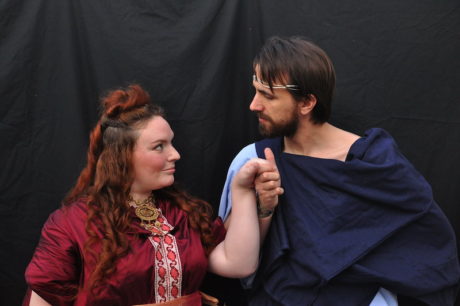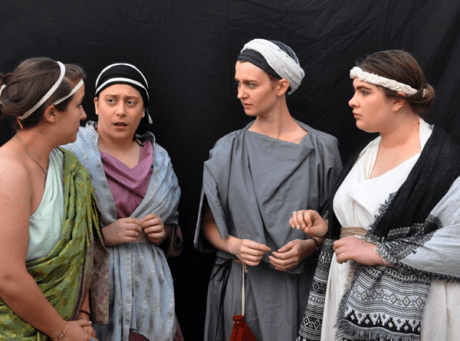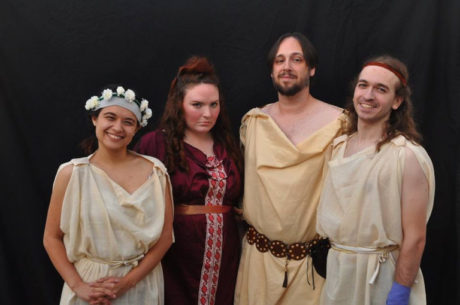Medea is often used as a byword for evil, for a woman scorned and her unquenchable rage. She is a warning of what a woman could do if she loses herself to her anger and jealousy—for what greater crime could a woman commit then the murder of her own children. But is that all there is to her? A two-dimensional virago. Director Leandra Lynn attempts to remove the audiences’ ‘safety’ and, in doing so, she brings Medea into her own.

Lynn’s Medea is set not on stage, where the curtain and the stairs makes the audience three steps (at least) removed from the action, but in the round. With four entrances at each corner and the play set on ground level, Medea is three-dimensional and close enough to touch. The audience experiences the action just as they would in real life and so the feeling is vastly changed. It is real life and real emotions in front of you, around you, and you can’t make Medea into a “them,” but must embrace her as an “us.”
This transformation of the archetype “Medea as villain” is assisted by the artful portrayal by Mary Burnett. Her Medea is not shrill or a termagant, but a hurt, dreadfully hurt, woman. You first hear Medea offstage, not cursing her husband, but crying in pain and wishing for herself to be harmed. Her emotions are as known to us as our own, because we’ve all been wronged by someone in our life whom we trusted and loved. Burnett plays her, not as the sorceress who poisoned her way to power—but as a woman who fell in love, made unredeemable sacrifices in her lover’s interests and often against her own, and finds herself cast away when a better bargain comes along.
Burnett highlights the isolation of Medea’s position, subtly forcing the audience to see her as alone in Jason’s new land. She ranges from the strong woman who has always gotten what she wanted to the broken woman who has lost everything—even refuge. Her quiet command of not just the language, but the rage, hurt, and desolation of Medea brings the audience into her plan and into why it seems to be the only way to win. Burnett’s Medea wants to win something, because she has lost everything. Perhaps her final solution is not one we would choose, but we understand how she got there.
Medea’s humanity is aided by the expert portrayal of Jason by Dan Clark. Jason is the hero of myth—and he has read a few too many of his own press releases. He has rewritten his story so that he can have what he wants now. He is no longer entranced by the foreign, exotic woman who aided him, but by a princess who brings with her status and a clear cut definition of himself as sole victor and hero of his own tale. Clark’s Jason is a self-assured confidant, and strides on stage wondering why Medea won’t just accept the new way of things. His bravado never veers into comic, but stays right on the emotional target of believability. He masterly explains why he’s doing this all to help Medea, and does the much harder task of making us believe that he truly knows this is what’s best for him—and therefore what is best for Medea.
This staying on the emotional plane of confident self-delusion makes his eventual loss of everything at Medea’s potions and blades painfully and undeniably real. It takes Jason from the cad who got what he deserved (and then some) and lets him be a real man who blindly and selfishly hurt and was then destroyed by vengeance. Clark’s Jason is a man we know, from his “mansplaining” of his infidelity to his heartbreaking loss.

The two characters are deftly supported by a strategic reimagining of the Greek chorus as a cadre of the women of Corinth. These six women define the stage and speak in different voices, often showing different reactions to the players in front of them. It is unusual, but effective. They circle the stage and invite the audience into the tragedy, begging them to see the inevitability.
Arielle Seidman, a founder of Britches and Hose, is also outstanding as the Nurse, her quiet helplessness in the face of Medea’s all-encompassing need for revenge. She is the voice of reason and of sanity, but like many cast in the same role, she is unable to calm the whirlwind that Medea’s emotions have become. Rather than sinking into the pathos of “what could I do,” Seidman’s nurse rages at her own powerlessness and becomes part of the chorus who must stand by and watch the end unfold.
Notable in their smaller roles are Dave Joria as Aegeus (Medea’s off screen second husband), Micheal Angeloni as Creon the king, Tom Barylski and Wendy Briggs as the children, Spencer Pilcher as their tutor, and especially entrancing Margaret Carson as the messenger. Carson delivers her monologue of death and mayhem with feeling and fury, at first respectful to her once mistress and then increasingly angry and disgusted at the mayhem Medea has caused. When she leaves the stage, her absence leave a tangible space of horror at the deaths.
The entire production is supported and enhanced by the masterful work of Mari Davis and Francesca Cesaro (who also appears as Aspasia, a member of the Chorus). Davis has created chitons and stolas of the Greek era using fabrics that define each character’s station. The rich red of Medea’s gown standing out in firm contrast to the prints and softer colors of her supporting cast, while the gold accents of Jason and Creon mark them as royalty and high born.
These garments are matched by the stunning hairstyles created by Cesaro. Seeking the well-known research of Janet Stephens, a hairstylist who has worked to untangle (pardon the pun) of Greek hairstyles, Cesaro creates lovely and accurate hairstyles that bring you into the time period without ever feeling forced or over dramatic. The make-up, also by Cesaro, is sparse, but bold—never distracting from the stage. It is beautifully and artistically done.
Lynn’s interpretation of Medea is a tight, crafted 90 minutes. This Medea breathes before you as a real woman, who chooses the unthinkable while enduring the unbearable. It is the strength of the actors, the production, and most notably the direction that makes Medea a living work of true emotion.

Britches and Hose Theatre’s production of Meda is a must see for lovers of tragedy and of stories well told.
Medea plays through September 25, 2016 at Britches and Hose Theatre Company performing at Green Acres Center – 4401 Sideburn Road, in Fairfax, VA. Tickets are $15 general admission or $10 for students/seniors/military, to be purchased at the door with cash or check only.
The review is by Jen Lofquist.
RATING:




